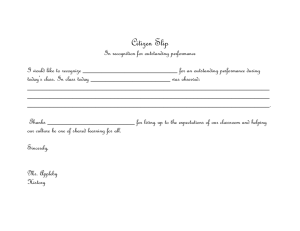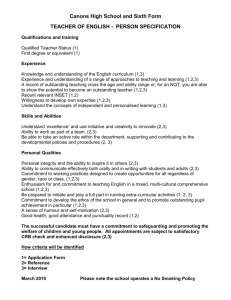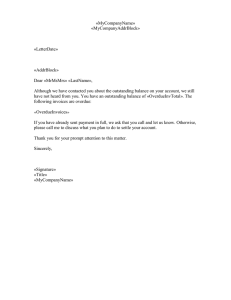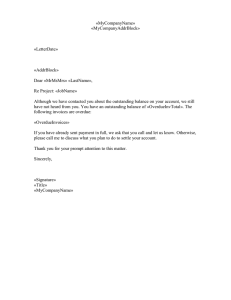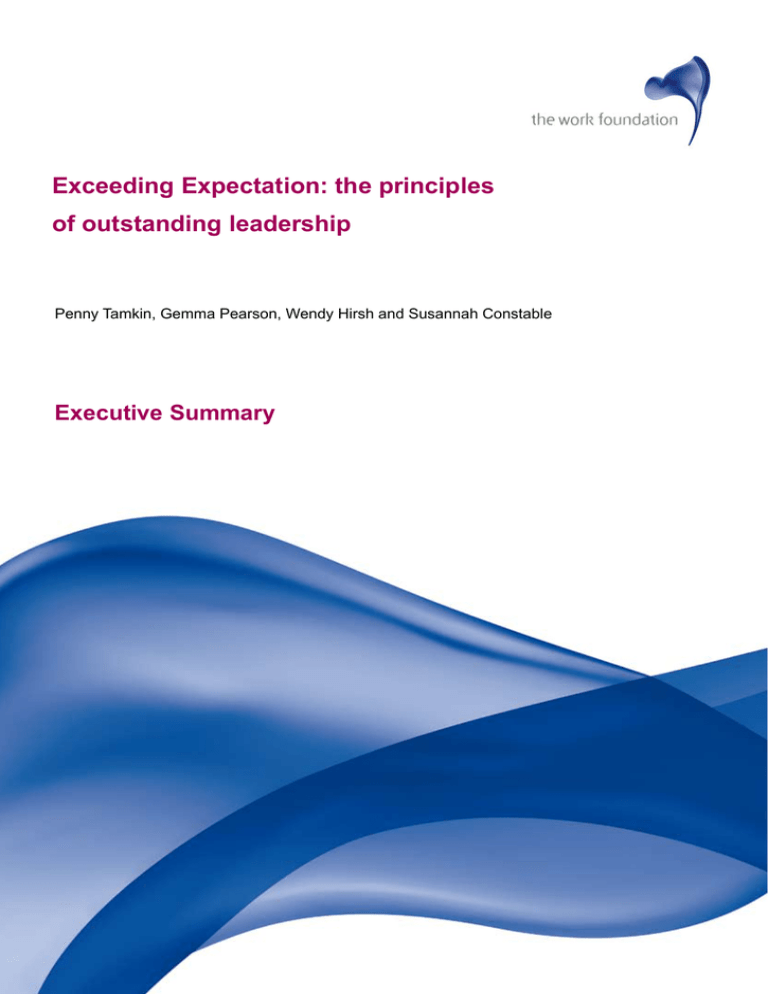
Exceeding Expectation: the principles
of outstanding leadership
Penny Tamkin, Gemma Pearson, Wendy Hirsh and Susannah Constable
Executive Summary
Exceeding Expectation: the principles of outstanding leadership – Executive Summary
Contents
1. Summary
3
2. The research process
3
3. Three principles of outstanding leadership
5
4. How does the research relate to current leadership thinking?
6
5. What does this mean for organisations?
7
6. Conclusion
9
7. Contact details
2
10
Exceeding Expectation: the principles of outstanding leadership – Executive Summary
Summary
This major research project set out to explore in depth the beliefs and practices of outstanding
leaders to test and bring new dimensions to the world of leadership theory.
The two-year qualitative study, captured in the full report Exceeding expectation: the principles
of outstanding leadership shows that outstanding leaders combine a drive for high performance
with an almost obsessive focus on people as the means of achieving this.
What is striking is that the research has uncovered clear differences between good and
outstanding leadership. There is now evidence to support a systemic, people centred approach
to high performance leadership. This is a paradigm shift for most leaders who remain focused
on the numbers and has implications for all organisations seeking to improve their performance.
The Work Foundation’s analysis of organisational performance summed up in Cracking
the Performance Code was the original trigger for this major research project. It highlighted
leadership as one of five key aspects of success, with a more democratic style of leadership
emerging as the hallmark of better performing organisations. As a consequence, The Work
Foundation committed to a two-year, in-depth project to explore leadership as part of its
endeavour to improve the quality of working life by equipping leaders and others with evidence,
advice and new thinking.
The research
A team of eight researchers conducted 262 in-depth meetings with leaders, their managers
process
and their direct reports in six of the UK’s most well known and enduring organisations: BAE
Systems, EDF Energy, Guardian Media Group, Serco, Tesco and Unilever. All the companies
showed sustainability; some had at some point in the recent past faced turbulent conditions and
survived, others continued to perform well in challenging circumstances and some were clear
market leaders. All are recognised as key players in their sectors. Each company identified 10
to 15 senior leaders to be interviewed: a total of 77 (15 women and 62 men) all of whom were
business unit managers or at a similar level. Each leader was interviewed twice, once about
their leadership philosophy and the second time about how they practised leadership.
The information which emerged was then categorised into nine broad headings: vision;
environment; relationships; power and control; performance; communication; culture, systems
and processes and self. At this point, the researchers took performance data for three-quarters
of the sample from their organisations (a mix of hard measures on meeting targets and
objectives as well as colleagues’ feedback). They then compared the responses of ‘good’ and
‘outstanding’ leaders under each of the nine categories.
3
Exceeding Expectation: the principles of outstanding leadership – Executive Summary
The results show some fascinating differences. For instance, all leaders talked about the
importance of engaging others in the vision but outstanding leaders conveyed a greater depth
and higher purpose when speaking about vision, seeing it as a clarion call which affected
employees’ commitment and engagement. Good leaders were more likely to see vision as
aligning people through a cascade of objectives.
When it came to creating the right working environment, all leaders understood the need for
trust, respect and honesty. But outstanding leaders understood how they combined to create the
conditions for exceptional performance. They also understood the role they played in creating
these conditions and were careful to be consistent even though that might mean controlling their
emotions and not betraying their own fluctuating mood.
In response to failure, outstanding leaders were more likely to try to maintain and build trust,
focusing on what an individual had achieved and how they could grow from the experience,
whereas good leaders might unwittingly fail to connect their actions and reactions with the
possible consequences.
Again, all leaders understood the importance of team spirit and engagement. But outstanding
leaders manipulated the environment through team bonding, removed hierarchy, formed deep
relationships and co-created plans rather than making a decision and simply asking people what
they thought.
And in discussion about processes, outstanding leaders were more likely to see the link
between behaviour and outcomes and use systems to provide greater clarity and the space
for meaningful conversations. Good leaders were less likely than outstanding leaders to link
processes to outcomes and were more focused on ensuring compliance.
In short, there were a number of clear differences between good and outstanding leaders in
each category as shown on the next page.
For the final stage of analysis, researchers took an overview of these differences and observed
nine clear themes which differentiated good and outstanding leaders (see panel on page 7).
These were explored exhaustively then condensed into three fundamental organising principles,
from which behaviour flows.
4
Exceeding Expectation: the principles of outstanding leadership – Executive Summary
Good
Three principles
of outstanding
leadership
Outstanding
Objectives and targets
People and engagement
Act due to beliefs and values
Act due to consequences
Focus on skill
Focus on attitude and engagement
Delegate task
Delegate space for autonomy
Believe leader holds responsibility
Wants team to own
Involvement in vision and strategy
Co-creation of vision and strategy
Give time to others
Focus on people as route to success
Tend to focus on work
Seek to understand people and motives
Vision as clarity of purpose
Vision as emotional clarion call
Focus on team structure and location
Focus on team cohesion and equality
Give a good impression
Reflect on symbolic role of leadership
Reflect on learning about job
Reflect on learning about self and others
People and task important
People at centre – task through people
WYSIWYG (What You See is What You Get)
Consistent and careful on behaviour
Development through learning and coaching
Develop through challenge and support
Use systems and procedures
Focus on few key procedures reduce burden
Attend to many things
People first then move on
1. They think and act systemically: they see things as a whole rather than
compartmentalising. They connect the parts by a guiding sense of purpose. They
understand how action follows reaction, how climate is bound and unravelled by
acts, how mutual gains create loyalty and commitment, how confidence provides a
springboard to motivation and creativity and how trust speeds interactions and enables
people to take personal risks and succeed.
2. They see people as the route to performance: they are deeply people and relationship
centred rather than just people-oriented. They give significant amounts of time and
focus to people. For good leaders, people are one group among many that need
attention. For outstanding leaders, they are the only route to sustainable performance.
They not only like and care about people, but have come to understand at a deep
level that the capability and engagement of people is how they achieve exceptional
performance.
5
Exceeding Expectation: the principles of outstanding leadership – Executive Summary
3. They are self-confident without being arrogant: self-awareness is one of their
fundamental attributes. They are highly motivated to achieve excellence and are
focused on organisational outcomes, vision and purpose. But they understand they
cannot create performance themselves. Rather, they are conduits to performance
through their influence on others. The key tool they have to do this is not systems and
processes, but themselves and the ways they interact with and impact on those around
them. This sense of self is not ego-driven. It is to serve a goal, creating a combination
of humility and self-confidence. This is why they watch themselves carefully and
act consistently to achieve excellence through their interactions and through their
embodiment of the leadership role.
How does
the research
relate to
The research provides overwhelming evidence for one of the popular ideas of current
management debate: that truly people-centred leadership leads to more effective performance.
Underpinned by a reliable evidence base, the report goes further than today’s popular
current
management theory – a good deal of which is derived from informed belief rather than empirical
leadership
research. This qualitative research has enabled deep and detailed engagement with the issues.
thinking?
In this way, the research findings both corroborate and diverge from contemporary leadership
theory.
For instance, the notion of dispersed leadership has a similar focus on people, but tends to
see leadership as dispersed through a group, with different people taking the lead in different
contexts. While the report describes the importance outstanding leaders place on empowering
others to deliver, there is no suggestion that they are simply giving up control to others or that
this evolves somehow naturally. Rather, these outstanding leaders see themselves as facilitating
and nurturing empowerment through a conscious philosophy and practice.
Similarly, servant leadership, an idea originating from Robert Greenleaf in the United States
during the 1960s which has been revived by a number of organisations in recent years, places
emphasis on the leader as serving the people. But while the outstanding leaders examined
in the research work through people, these people are not their sole client. Instead, they
understand excellent performance is reliant on people. So the need is to engage others in the
endeavour. The team is then motivated by a common purpose and goal. Outstanding leaders
focus on the outcome as the purpose and align people to this.
Compared with the principles expressed by those espousing transformational leadership, there
are many similarities but we see the characteristics of transformational leadership in both good
and outstanding leaders. Both seek to create compelling vision, live their values, and focus
on the individual. Outstanding leaders however, place less emphasis on charisma. While they
6
Exceeding Expectation: the principles of outstanding leadership – Executive Summary
recognise that being positive is important, being consistent and creating purpose are more
so. Instead, outstanding leaders speak about seeing the whole, about acting in systemic and
sophisticated ways to create excellence, and about focusing on capability and autonomy of
people to deliver. They recognised that how they are with people hinders or helps to galvanise
others behind the vision.
What does
this mean for
organisations?
The research begs a number of questions: how do organisations identify people with potential
to become outstanding leaders? To what extent can the required behaviour be developed? And,
assuming it can be, what kind of management development will work best?
The report’s researchers observe that there may not be a continuum from average leadership
to outstanding leadership and that people with potential to become outstanding leaders may
behave in a recognisably different way early in their careers.
But becoming an outstanding leader is likely to depend a great deal on maturity, self-awareness
and self-development within the job. Some of the outstanding leaders featured in the research
did not originally have a people-focused approach, but realised the impact they were having
on people and therefore adjusted their style accordingly. They arrived at this point through
experience, maturity and reflection. They had a very sophisticated understanding of cause and
effect and how their actions can dramatically affect outcomes.
Researchers conclude that development of outstanding leadership needs a different approach
to the traditional models of talent identification and development and the second phase of the
research programme is now examining the implications for leadership development.
Nine themes which characterise outstanding leaders
1. Think systemically and act long-term
Outstanding leaders achieve through a combination of systemic thinking and acting for
the long-term benefit of their organisation. They recognise the interconnected nature of
the organisation and therefore act carefully.
2. Bring meaning to life
Outstanding leadership enables a strong and shared sense of purpose across the
organisation. They emphasise emotional connection for people with a focus on passion
and on ethical purpose.
7
Exceeding Expectation: the principles of outstanding leadership – Executive Summary
3. Apply the spirit not the letter of the law
Outstanding leadership focuses on the few key systems and processes which help
provide clarity, give structure, enable feedback, allow time for discussion and enable the
development of vision. They use them to achieve outcomes rather than focus on the
process, and put flexibility and humanity first.
4. Self-aware and authentic to leadership first, their own needs second
Outstanding leaders unite a deep understanding of others, high levels of self-awareness
and a systemic appreciation of their symbolic position to become a role model for
others.
5. Understand that talk is work
Outstanding leadership depends on trusting and positive relationships that are built
over time for the long-term benefit of the people and their organisation. They spend a
significant amount of time talking with people to understand what motivates and how they
can support and boost enthusiasm in others.
6. Give time and space to others
Outstanding leaders both give significantly more time to people than non-outstanding
leaders and allow their people considerably more freedom and influence over the work
they do and how they do it.
7. Grow people through performance
Outstanding leaders passionately and constantly invest in their people and use the
challenges presented every single day to encourage growth, learning and engagement.
8. Put ‘we’ before ‘me’
Outstanding leaders work hard on issues such as team spirit, shared decision making,
collaborative working and a strong bond within and between teams. Sustainable
performance comes from collective wisdom and intent, encouraging people to get
involved, and giving them voice and autonomy.
9. Take deeper breaths and hold them longer
Outstanding leaders actively build trust by delivering on promises and acting with
consistency, which in turn, leads to a sense of security and greater freedom of expression.
They understand the power of trust to speed up interactions, enable people to take risks,
diminish arguments or disputes and underpin innovation.
8
Exceeding Expectation: the principles of outstanding leadership – Executive Summary
Conclusion
The research explores how outstanding leaders think and act differently to their good peers, and
in doing so finds evidence of how a highly people-centred approach to leadership can result in
outstanding performance.
It does, however, go beyond this. Outstanding leaders are focused on sustainable performance,
purpose and meaning, knowing that people are the only route to its achievement and that they
themselves enable others through their influence on those around them. They also have broad
horizons and a deeply connective philosophy, with an ability to see how the people and systems
in an organisation fit together and a vision that extends from the past, through the present and
into the future.
The report’s researchers stress that the emphasis on people-centred leadership is particularly
critical while the world is still experiencing tough economic conditions. They point to the
widespread tendency to assume that in difficult times, people think they need powerful leaders,
with a controlling, target-driven approach. Yet, evidence from the research indicates the
opposite, demonstrating that this instinct can be counter-productive.
9
Exceeding Expectation: the principles of outstanding leadership – Executive Summary
Contact details
Penny Tamkin
Programme Director, Leadership
The Work Foundation
T: 020 7976 3607
E: ptamkin@theworkfoundation.com
Media enquiries:
Christine George
Media and Marketing Officer
The Work Foundation
T: 020 7976 3554
E: cgeorge@theworkfoundation.com
10
All rights reserved. No part of this publication may be reproduced, stored in a retrieval system or
transmitted, in any form or by any means, electronic, mechanical, photocopying, recording and/or
otherwise without the prior permission of the publishers. This publication may not be lent, resold,
hired out or otherwise disposed of by way of trade in any form, binding or cover other than that in
which it is published, without the prior consent of the publishers.
To obtain permission, please contact nhall@theworkfoundation.com
We provide:
Research
Advisory Consulting
Policy and Voice
Partnership
The Work Foundation is the leading independent authority on work and its future.
It aims to improve the quality of working life and the effectiveness of organisations
by equipping leaders, policymakers and opinion-formers with evidence, advice, new
thinking and networks.
© The Work Foundation
Registered as a charity no: 290003
First published: January 2010
The Work Foundation
21 Palmer Street
London
SW1H 0AD
Telephone: 020 7976 3500
Email:enquiries@theworkfoundation.com
Website: www.theworkfoundation.com


